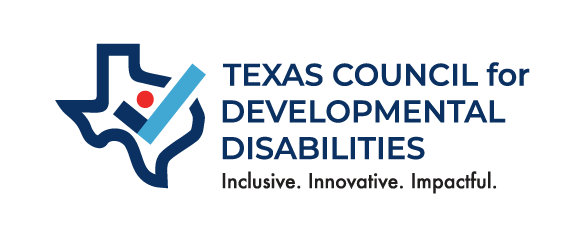
To: Texas Public Health Officials and Leaders
From: Beth Stalvey, MPH, PhD, Executive Director
RE: COVID-19 Response for Individuals with Developmental Disabilities
The Texas Council for Developmental Disabilities (TCDD) thanks you for your efforts to protect all Texans during this worldwide pandemic. TCDD would like to offer the following resources and considerations for individuals with developmental disabilities (DD).
TCDD is established by state and federal law and is governed by 27 Governor-appointed board members, 60% of whom are individuals with DD or family members of individuals with disabilities. The primary role of TCDD is to advocate for responsive policies and programs that ensure Texans with DD have the opportunity to live, work, and contribute to the community of their choice.
Our Council members have expressed the following concerns and hope to partner with you as you continue to educate, prevent, and respond to COVID-19 in Texas.
System Planning and Response
Community Education
Individual Protection and Prevention
Congregate and Residential Settings
Work and School
We know that COVID-19 is testing our support systems in new ways for all Americans. For Texans with DD who regularly rely on our system for their daily needs, the greater risk may not be from the actual disease, but from how the disease could disrupt critical services and supports.
TCDD is here to assist in these efforts by providing educational resources; identifying system support needs for individuals with DD; and connecting with a diverse network of organizations and disability experts at the national, state, and local level.
We have begun compiling specific resources on our website at www.tcdd.texas.gov. You can also contact me directly at Beth.Stalvey@tcdd.texas.gov.
Sincerely,
Beth Stalvey, MPH, PhD
Executive Director
6201 E. Oltorf St., Suite 600 | Austin, TX 78741-7509 | www.tcdd.texas.gov
6201 E. Oltorf St., Ste. 600
Austin, TX 78741-7509
Phone: 512-437-5432
Toll-Free: 1-800-262-0334
Email: tcdd@tcdd.texas.gov
TCDD welcomes innovative ideas and suggestions of activities to implement the Goals and Objectives in the TCDD State Plan.
Email tcdd@tcdd.texas.gov or complete the online feedback form to submit your ideas.
6201 E. Oltorf St., Ste. 600
Austin, TX 78741-7509
Phone: 512-437-5432
Toll-Free: 1-800-262-0334
Email: tcdd@tcdd.texas.gov
TCDD is committed to ensuring digital accessibility for everyone. We continually work on compliance, applying best practices and web standards. To learn more, read our accessibility statement.
6201 E. Oltorf St., Ste. 600
Austin, TX 78741-7509
Email: tcdd@tcdd.texas.gov
This work is supported by a grant from the U.S. Administration for Community Living (ACL), Department of Health and Human Services (HHS), Washington, D.C. 20201 with a 100% federal funding award totaling $6,161,072. Council efforts are those of the grantee and do not necessarily represent the official views of nor are endorsed by ACL, HHS, or the U.S. government.